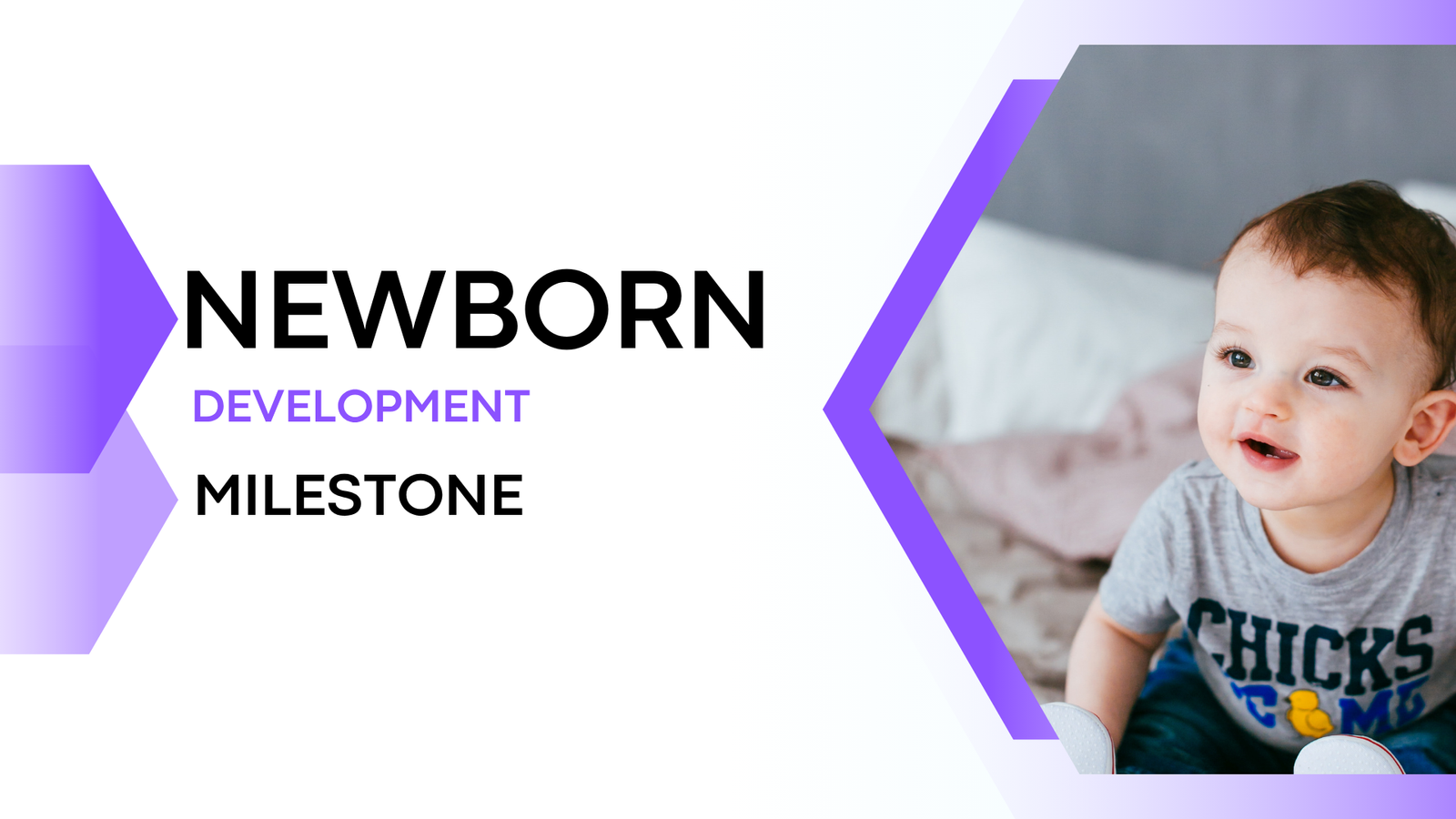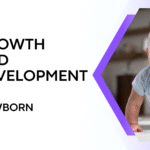Watching your baby grow is one of the most heartwarming parts of parenting. From the first smile to the first time they lift their head, every tiny achievement feels magical. But did you know that each of these moments is part of a carefully designed journey of growth known as newborn development milestones?
These milestones are not just cute moments — they’re signs that your baby’s body and brain are developing as they should. Understanding what to expect during your baby’s first year helps you track their progress, support their growth, and celebrate their achievements confidently.
In this guide, we’ll walk you through the major newborn development milestones, month by month, and nurture your baby’s development every step of the way.
Simplify parenting with our app.
Click on This Link

What Are Newborn Development Milestones?
Newborn development milestones are specific skills or abilities that most babies achieve within a certain age range. These milestones cover four main areas of growth:
- Physical Development – How your baby moves and gains control over their body (like lifting the head or grasping objects).
- Cognitive Development – How your baby learns, remembers, and understands things.
- Language Development – How your baby communicates, through crying, cooing, and eventually, babbling and words.
- Social and Emotional Development – How your baby bonds with you, expresses emotions, and recognizes familiar faces.
Every child grows at their own pace, so don’t worry if your baby reaches a milestone a little earlier or later than others. What’s important is consistent progress.
Month-by-Month Guide to Newborn Development Milestones
Let’s explore the first year of your baby’s incredible journey.
Month 1: Adjusting to the World
In the first month, your newborn is adjusting to life outside the womb. Their movements may be jerky, and their vision is still blurry.
Milestones:
- Responds to loud sounds
- Recognizes your voice and scent
- Moves arms and legs actively
- Focuses on faces for a few seconds
Parental Tip:
Hold your baby close, make eye contact, and talk gently — this builds a sense of security and trust.
Month 2: Awareness Begins
Your baby starts to become more alert and curious about the world.
Milestones:
- Smiles in response to familiar voices or faces (social smile)
- Begins to coo or make gurgling sounds
- Follows moving objects with eyes
- Lifts head briefly during tummy time
Parental Tip:
Encourage tummy time daily to help strengthen neck and shoulder muscles.
Month 3: Expressive and Engaged
By now, your baby is becoming more interactive.
Milestones:
- Recognizes caregivers
- Smiles often and enjoys social play
- Holds head up steadily
- Opens and closes hands voluntarily
Parental Tip:
Talk, sing, and smile often — these simple acts boost emotional bonding and language learning.
Month 4: Movement and Joy
Your baby starts showing control and excitement.
Milestones:
- Rolls from the tummy to the back
- Laughs out loud
- Reaches for toys
- Babbles in different tones
Parental Tip:
Provide colorful, safe toys to encourage reaching and grasping.
Month 5: Discovery Mode
Exploration becomes a big part of your baby’s day.
Milestones:
- Recognizes familiar people from a distance
- Responds to their name or tone of voice
- Grasps and shakes toys
- Begins teething in some cases
Parental Tip:
Read short, rhythmic stories — they help your baby recognize patterns in sound and speech.
Month 6: Sitting and Smiling
Half a year already! Your baby’s coordination improves rapidly.
Milestones:
- Sits with support
- Responds to emotions
- Imitates sounds
- Transfers objects between hands
Parental Tip:
Encourage playtime on the floor — it strengthens muscles and motor skills.
Month 7: Independence Begins
Your little one starts showing curiosity and independence.
Milestones:
- Rolls both ways
- Begins to crawl or scoot
- Responds to their name
- Shows a preference for caregivers
Parental Tip:
Provide safe spaces for exploration — babies learn best when they move freely.
Month 8: Curious and Communicative
Your baby’s personality begins to shine through.
Milestones:
- Understands “no”
- Plays simple games like peek-a-boo
- Pulls up to stand
- Imitates facial expressions
Parental Tip:
Encourage interaction — talking, singing, and playing strengthen emotional connections.
Month 9: Busy and Brave
Your baby is on the move and loves exploring.
Milestones:
- Crawls confidently
- Uses thumb and forefinger to pick up objects
- Recognizes familiar faces
- Shows separation anxiety
Parental Tip:
Stay patient — clinginess is a healthy sign of attachment and emotional growth.
Month 10: Understanding and Responding
Cognition leaps this month.
Milestones:
- Responds to simple instructions (“Come here!”)
- Waves goodbye
- Points at objects of interest
- Tries to imitate actions like clapping
Parental Tip:
Encourage your baby to participate in daily activities — imitation builds learning skills.
Month 11: Balancing and Babbling
Your baby is growing confident and interactive.
Milestones:
- Cruises along furniture
- Says simple words like “mama” or “dada”
- Shows affection through hugs or kisses
- Understands cause and effect (e.g., dropping toys on purpose)
Parental Tip:
Offer support and praise for every little attempt — confidence builds through encouragement.
Month 12: The Big One-Year Mark
Your baby may take their first steps — a huge milestone!
Milestones:
- Stands or walks with assistance
- Understands simple commands
- Points to body parts when named
- Tries to feed themselves
Parental Tip:
Celebrate every step (literally!) — these moments mark the end of the newborn stage and the start of toddlerhood.
How Can Parents Support Newborn Development Milestones?
- Respond to Baby’s Cues:
When your baby cries, coos, or smiles, respond lovingly — it builds emotional security. - Encourage Tummy Time:
It strengthens muscles needed for crawling and sitting. - Read and Talk Often:
Narrating your day helps build language comprehension early on. - Playtime Is Learning Time:
Interactive play stimulates cognitive and motor development. - Ensure Proper Nutrition:
Breast milk or formula provides essential nutrients for brain and body growth. - Provide Safe Exploration:
A baby-proofed environment encourages movement and curiosity safely. - Stay Patient and Observant:
Each baby develops differently — consistency and encouragement matter most.
Why Tracking Newborn Development Milestones Matters?
Tracking newborn development milestones helps parents ensure that their baby is progressing as expected. Early detection of any delay allows pediatricians to provide timely guidance or intervention.
Common Myths About Newborn Development Milestones
- Myth: All babies should develop at the same pace.
Truth: Each baby follows their unique timeline. Small variations are normal. - Myth: Delayed milestones always indicate a problem.
Truth: Some delays can be temporary — but tracking helps you spot patterns early. - Myth: Talking to babies too early doesn’t help.
Truth: The earlier you communicate, the stronger your baby’s language and emotional skills become.
When to Consult a Pediatrician?
You should consult your doctor if your baby:
- Doesn’t respond to sound or light by 2 months
- Has stiff or floppy limbs
- Doesn’t smile by 3 months
- Can’t hold head up by 4 months
- Shows no interest in people or surroundings by 6 months
Early consultation ensures that any developmental concern is addressed promptly.
How KidsCur Supports Parents in Tracking Baby Milestones?
Parenting can feel overwhelming, especially when juggling so many details — but technology can make it easier. The KidsCur app acts as your smart companion for monitoring your baby’s growth, health, and milestones. With the app, you can:
- Log every milestone, big or small
- Receive gentle reminders for vaccinations and checkups
- Access expert-backed parenting articles and tips
- Store your baby’s health data securely
- Track progress through beautiful growth charts
It’s everything a new parent needs, right at their fingertips. Download the KidsCur app today and make tracking your baby’s newborn development milestones simple, joyful, and stress-free!
FAQs
Why are newborn development milestones important for parents to track?
Tracking newborn development milestones helps parents understand if their baby is growing and learning at a healthy pace. It enables the early identification of any delays, allowing parents to seek timely medical advice or support. Monitoring milestones also helps parents celebrate each stage of their baby’s progress with confidence.
What if my baby doesn’t meet a milestone on time?
Every baby develops at their own pace, so slight variations are normal. However, if your baby consistently misses multiple milestones or shows signs of delay—such as not responding to sounds, failing to make eye contact, or exhibiting poor muscle control—it’s best to consult a pediatrician. Early intervention can make a big difference in development.
How can the KidsCur app help in tracking newborn development milestones?
Parents can record growth, health updates, and progress in one place. The app also sends reminders for checkups, vaccinations, and key milestones — helping parents stay informed and proactive.



